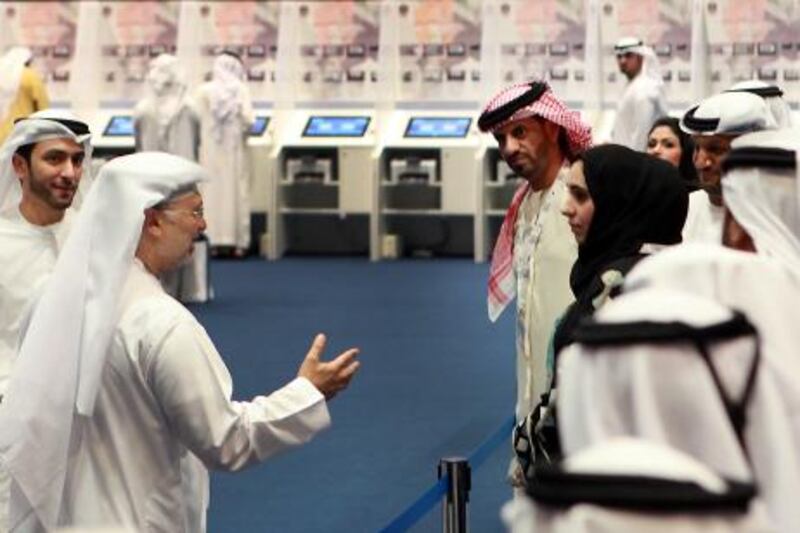ABU DHABI // Hundreds of voters filed into Abu Dhabi’s polling stations from early in the morning to ensure they could cast their vote.
But while the process ran smoothly at the capital’s two stations yesterday, there were machine faults in Al Ain and Al Gharbia.
A little more than an hour before the original 7pm deadline for voters, it was announced that polling would stay open for an extra hour to ensure everyone had a chance to vote.
________________________________________________________________________________________
_______________________________________________________________________________________
At the Abu Dhabi National Exhibition Centre, more than 20 voters were waiting when the doors opened at 8am. Candidates had already voted.
“I wanted to come even before, at 6am,” said Bukhait Hatem Al Mehairmi.
Abdulnaser Al Rashedi, one of the first to vote, said he found the process easy and well ordered.
“Voters are shown a training video first, then they can practise on demo voting booths,” Mr Al Rashedi said before they then go and cast their vote on a touch screen.
“It was all easy. It didn’t take more than five, 10 minutes.”
Security was high, with metal detectors at every entrance.
Once candidates had voted they were under orders not to speak to other members of the electorate, but many of them were found to be mingling with voters just outside the hall.
As the day wore on, their early enthusiasm gave way to stress as the flow of voters became a torrent.
Most voters were unwilling to say for whom they had cast their ballot.
“We have one of our family members running, so we voted for them,” said one voter.
“But for the others, we picked the people who deserved it based on their programmes.
“There is a lot of tribal preference here. We found that the majority of people are voting for people from their tribe.”
In Al Ain, the polling station appeared to have been overwhelmed by the numbers who came. The head of the election centre, Dr Ali Salem Al Tunaiji, said he had spoken to the heads of Abu Dhabi’s other centres and believed his was the busiest.
That, combined with some voter confusion about the process, led to problems. For two hours the voting machines broke down, leading some to leave without casting a ballot.
Aziz Homoud Al Amri, the national head of election centres, said the morning’s high turnout had been a surprise.
But Mr Al Amri assured those worried that the booth had not printed out their ballot paper that their votes had been registered and would be counted.
Mohammed Youssef, 41, a government employee, arrived with his brother at 8am hoping to cast his vote then get on with his day.
After two hours and 20 minutes, Mr Youssef finally did.
“This was very disorganised,” he said. “I had to wait for two hours to vote. My legs grew tired from standing around.
“There were no chairs for us to sit on and no one was giving us anything to drink. I’m also unhappy that the men and women were not kept separated.”
An elderly woman, who declined to give her name, left in frustration without voting, shouting at election officials that she was tired of waiting.
“This is all very disorganised,” she said. “I waited and waited and got tired. I’m an old woman. I can’t just stand around all day. I’m going home.”
The Abu Dhabi candidate Mansour Al Faheem expressed concern that some people may have been deterred from voting by the problems in Al Ain.
“It is the weekend, people have taken time out of their lives to go to the polling stations,” Mr Al Faheem said. “If they are not working they may just leave and it is very unlikely that they come back.”
Mubarak bin Ali, who was not entitled to vote, was one of the first arrivals. He wanted to witness the “national event”.
“The UAE is the only country in the Arab world which is seeing this kind of democracy,” he said.
“Here the leader built the nation, not the other way round like in other countries.”
osalem@thenational.ae
ealghalib@thenational.ae






